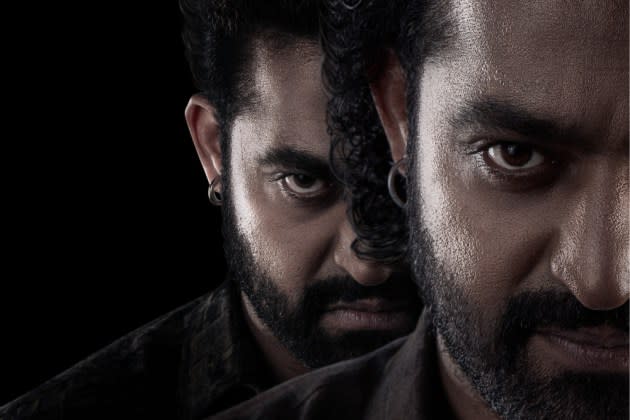‘Devara’ Review: N. T. Rama Rao Jr.’s ‘RRR’ Follow-Up Turns Out to Be a Taxing Watch

Marketed from the outset as “Devara: Part 1,” the latest Telugu action offering featuring “RRR” co-lead N. T. Rama Rao Jr. (or Junior NTR) is both incomplete and overlong. It relies heavily on the superstar’s charisma — to the point of casting him in two roles — but director Koratala Siva seldom imbues his pirate village saga with the gravity needed to ground the actor’s poise and persona. The result is a scattered and often excruciating mess of macho tropes that fails to recognize its own latent themes, and seldom comes to life even on its own terms.
Taking a page from Hollywood’s “Dune” and “Spider-Verse” franchises, mainstream Indian cinema is living through a scourge of half-films and first parts that are all setup and no satisfaction. On the Tollywood front alone, “Devara” joins the likes of “Salaar: Part 1 – Ceasefire” and “Kalki 2898 AD” as a new movie hellbent on inelegantly explaining wider lore rather than letting it play out dramatically. However, where “Salaar” and “Kalki” had the decency to relegate this clunkiness to their second halves, Siva’s film (which he also wrote) begins in 1996 with lengthy discussions about a terrorist conspiracy surrounding the then-upcoming Cricket World Cup, as authorities discuss and are subsequently led to one suspect and then another and so on. None of this is relevant to the actual film, however. The 20-minute introduction feels designed to establish a future sequel, as a policeman is led to an old man wistfully sitting by the shore, who then (mercifully) regales him with the movie’s actual story, which plays out entirely in flashbacks.
More from Variety
'RRR' Star NTR Jr's 'Devara' Scores $3.5 Million in Pre-Sales (EXCLUSIVE)
'RRR' Star NTR Jr.'s 'Devara' Unveils First Footage - Global Bulletin
With this extraneous context out of the way, the film finally kicks off for real with a story set 12 years in the past (and with hints of its own flashbacks to centuries prior), establishing a relatively isolated island community whose de facto chief, the seafaring Devara (NTR), leads his men in nocturnal raids of shipping vessels at the behest of rich smugglers who would rather sneak their illicit goods into India instead of dealing with authorities.
Devara, like most South Indian action heroes, possesses fearsome strength and skill, and is rivaled only by his best friend Bhaira (Bollywood star Saif Ali Khan), with whom he has ideological disagreements. Their culture worships blades and weapons, which Devara claims are meant for protection rather than attack, though Bhaira is quick to go on the offensive. This leads to perhaps the movie’s only fun, thematically cogent and visually exciting fight scene, during which Bhaira and most of the village warriors attempt to kill members of the Indian Coast Guard who capture them mid-heist, only for Devara to swing into action as a means to prevent further bloodshed.
However, the thrill of this pull-and-push doesn’t last. The rest of the action, while alluringly lit, lacks physical weight, and it isn’t long before Devara falls down a rabbit hole of ruthless fascist violence against his own kin, which the movie doesn’t frame as such. In fact, it grants itself a Get Out of Jail Free card by never establishing Bhaira’s motives, nor that of his followers. When Devera turns a new leaf and bars them from resuming their smuggling duties, are their objections to his edict purely ideological? Or are they economic too, given that this was their livelihood? Are their people now being starved, or do they have plenty? Who’s to say.
Their island may be the visual center of the film, but it has no real thematic or emotional presence. Their rituals are distinctly “Black Panther”-esque, with succession determined through hand-to-hand combat between rival villages, but there’s no real sense of how their kingdom relates to the outside world, the rest of the country or even its own people. Visually and narratively, “Devara” is all noise with little meaning.
As with the action, which delivers a solitary interesting scene, there’s but one celebratory dance number early on that has any physical energy to it. NTR brings his A-game both as the mighty Devara and, in the movie’s second half set in the ’90s, Devara’s clownish, far less capable son Vara. Unfortunately, the latter’s malformed romantic subplot with the comically aroused village girl Thanga (Janhvi Kapoor) is a headache and goes nowhere. Meanwhile, Khan is granted the kind of intensity and stature seldom afforded to him in his Hindi-language roles of late, but getting used to the dubbing by his gruff Telugu voice actor P. Ravi Shankar might be disorienting, given Khan’s usually chipper, high-pitched voice.
Any strengths “Devara” has are fleeting, and they seldom compensate for its protracted three-hour setup to a climactic cliffhanger that reveals the movie could have been more interesting all along, had it chosen to play its cards earlier. Instead, it keeps them close to the chest and filibusters wildly, as Devara disappears for lengthy stretches, taking any hint of charisma with him.
Best of Variety
From 'The Perfect Couple' to 'Uglies': The Best Book-to-Screen Adaptations to Read This Year
Labor Day Is Over But These Deals Are Still Better Than Ever: Dyson, Nespresso, Le Creuset and More
Sign up for Variety's Newsletter. For the latest news, follow us on Facebook, Twitter, and Instagram.
